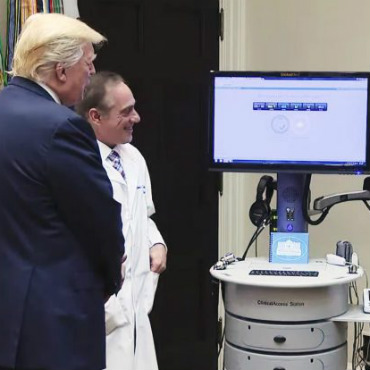VA telehealth expansion needs boost from Congress
The White House and Veterans Affairs chief are pushing for expanded telehealth, but the department may need some legislative help to get there.

VA Secretary David Shulkin demonstrates the VA's telehealth app at an Aug. 3 White House event.
The White House and Department of Veterans Affairs Secretary David Shulkin are pushing ahead for expanded telehealth, but the department may need some legislative help to maximize its reach.
Through its new VA Video Connect app, which debuted at an Aug. 3 White House event, VA plans to expand its medical services into patients' homes and offices of private medical practices around the country. The app is expected to be available nationwide in October.
At an Aug. 30 House Veterans Affairs Oversight and Investigations subcommittee field hearing in Michigan, Executive Director for Telehealth Services of the Veterans Health Administration Dr. Kevin Galpin testified that achieving maximum benefit of the VA's video telehealth services requires legislative fixes.
While VA does have authorities to issue regulations to expand its telehealth services, "legislation would be by far the preferred choice," Galpin said. "It's the most comprehensive and could still be done faster than we could get regulations through comment periods."
Specifically, he said that passing legislation would ensure broadband access to rural areas and would allow VA to service veterans across the border and patients with controlled-substance abuse issues.
"We should not have barriers.... Legislation can take us farther than regulations can," he said. "If I have a provider that can deliver a service, if I have a veteran who needs a service, we should be able to connect them, simply, no questions asked."
Another area where a legislative fix is the "best approach," Galpin said, is funding for the VA Video Connect app.
Galpin testified that the video program, based on a departmental assessment, would require an additional $25 million in annual IT funding.
"That's something we currently don't have funds for," he said.
The department, explained deputy CIO and account manager for health at VA Alan Constantian, is legally restricted from moving money around to cover the costs, and as a result, VA does not have the funds in its current budget to invest in its IT infrastructure, which leads to "very difficult choices."
For the Office of IT, Constantian continued, "there are so many excellent [health care] ideas that require IT funding, typically between three times and five times the amount of money that we have available for development of those services."
Because of the significant overlap between IT and medical services, having separate funds for each "creates for us a lot of challenges in the telehealth space... because of legislation," added Galpin.
"And in the area of telehealth, it's particularly confusing because we have a clinical bucket of money and a technology, IT, bucket of money," he said. "When I buy a tablet for a veteran, is it IT money, is it clinical money? And depending on the situation it could be either, and that confuses people."
NEXT STORY: GSA IG reviewing Trump hotel lease





